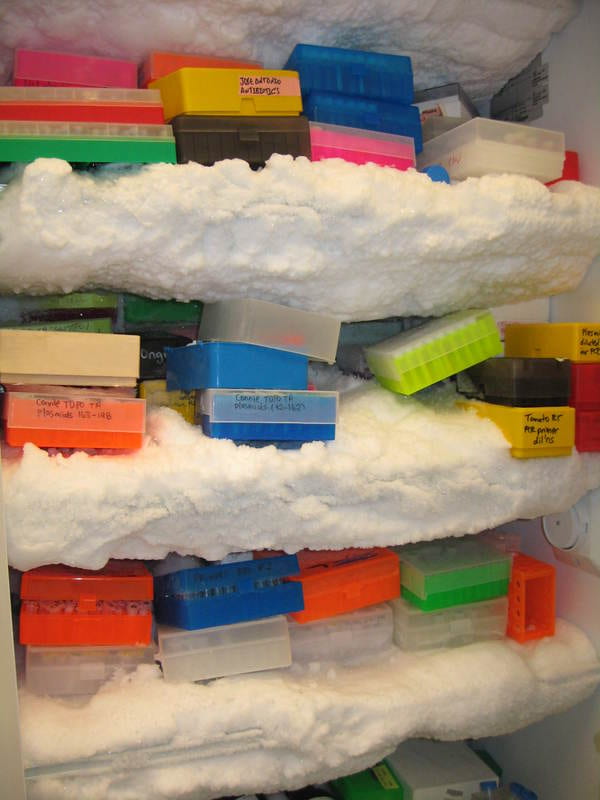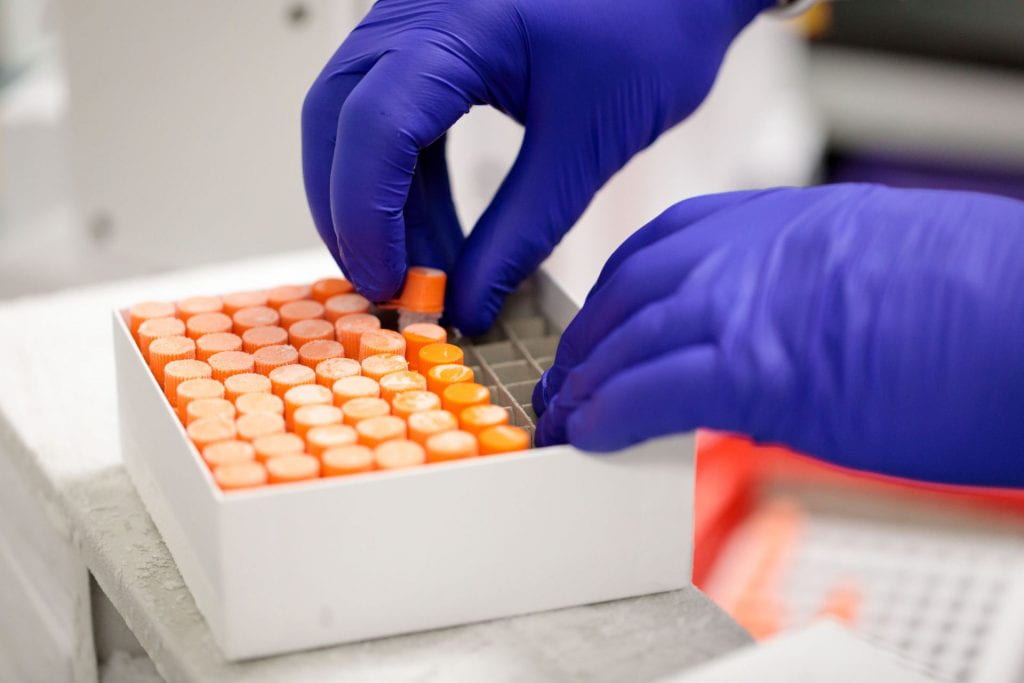Written by Alicia Hubert, WUSM Sustainability Lead and Green Labs Program Coordinator
Research labs rely on a wide range of appliances and electronics to complete their research and function on a daily basis. Chances are, your lab has at least one -20 freezer, -80 freezer, or even a -150C freezer, if not several of each. These appliances, while vital to your research, use significant amounts of energy that lead to greenhouse gas emission. Reducing these emissions by selecting high-efficiency (or Energy STAR) appliances when purchasing is a great first step, but proper maintenance plays a critical role in reducing emissions over the lifespan of the unit – whether high-efficiency or standard efficiency.
When freezers and refrigeration units are not managed or maintained properly, these emissions increase from the machine struggling to maintain internal temperatures and running more than necessary. Add in the risks of refrigerant leaks, and these mishaps become a serious risk to our environment.
Washington University implemented a ULT Policy in 2019 to begin addressing the emissions and harmful refrigerants present in some ULT freezers. The policy requires all newly purchased ULT freezers to be high-efficiency (aligns with Energy STAR standards) and utilize only natural refrigerants with dramatically less global warming potential than previously used refrigerants.
The next step is for WashU researchers to retire old freezers – ULT freezers reach their end of life at 10 years of age and university records show 30+ year old freezers still in use on our campuses. When a freezer is disposed of properly through Environmental Health & Safety (EH&S), the refrigerants are safely sequestered and the appliance itself is properly disassembled and recycled in a variety of ways by our vetted, contracted electronics waste recycler. This reliable and safe process brings peace of mind to researchers concerned about getting rid of an appliance that still works. When an old freezer is replaced by a new high-efficiency model, nearly 7,000 kWh of energy are saved annually – an admirable environmental ‘win’ the equivalent in taking 1.1 passenger cars off the road for a year.
However, retiring old units is just one piece of this complex puzzle. Regular maintenance and wise storage practices help reduce required freezer capacity and how hard the units need to work to maintain their internal temperatures. The International Freezer Challenge will help us all assess our current cold storage and how to operate more efficiently.
The Challenge
The International Freezer Challenge has been encouraging labs to perform routine maintenance on their freezers since 2017. These efforts have resulted in the saving of over 9.9 million kWh – or the equivalent emissions of driving a car 15 million miles!

For the first time, Washington University is going to join the challenge! Beginning in January 2022, researchers across the university will have 6 months to earn points by completing any of the following actions:
- Defrosting freezers.
- Cleaning out freezers and refrigerators .
- Inventorying samples, disposing of those that are no longer needed or viable.
- Storing samples at high density to reduce unused freezer space.
- Adjusting the set point of ultra-low temperature freezers or “warming up” to -70C instead of -80C if your samples allow.
- Storing samples at appropriate temperatures based on need, not on factory freezer settings.
- Retiring old (>10 years) refrigeration/freezer units.
- Replacing older refrigeration/freezer units with energy-efficient units per the WashU ULT Freezer Policy Guidelines.
- Sharing refrigeration space with a colleague.
- Barcoding samples to reduce time spent searching with the freezer doors open.
- Trying/adopting room-temperature sample storage when applicable.
How to Get Involved
Step 1: Join the Green Labs Program by filling out a quick commitment form. Once you’re signed up, your lab will begin receiving targeted notifications, signage, and support to reduce the negative environmental impacts of your research activity. Registered Green Labs can also request signage to hang in their lab spaces to help their colleagues make sustainable choices as well.
Step 2: Keep an eye out for the official start to the challenge in January 2022. The January announcement will include registration details, scheduling needs, and how to record your actions and points. There is no rush to complete the actions all at once; the challenge runs through July. Depending on participation, freezer defrosts and clean-outs may need to be scheduled in advance.
Step 3: The Green Labs Coordinator will keep a record of all WashU points and submit for award consideration when the challenge ends in July 2022. In addition to the official challenge awards, labs with the highest number of recorded points will receive special recognition and prizes from the WashU Sustainability team.
Important Considerations
- Further instructions will be provided in January to labs who plan to participate and depending on the level of interest, labs may need to sign-up for designated clean-out times to ensure all compliance requirements are met.
- Begin by inventorying and inspecting the samples and items stored in your freezers. If anything looks broken, damaged, or unsafe in any way, contact EH&S for guidance before disposing or defrosting your freezer.
- Feel free to work with your preferred freezer maintenance professional to have your freezer defrosted and seals inspected.
- If your freezer is currently labeled for radioactive material storage, please contact Radiation Safety for a survey on the unit after defrosting but prior to any maintenance or inspection being performed, and prior to disposal or transfer of the unit.
- Please only conduct a freezer defrost during normal business hours during the week, in case you need to contact EH&S regarding discovered unwanted material.
- If you know in advance that there are spilled chemicals or broken vials/samples in the freezer, contact EH&S before beginning your defrost.
- Always place large autoclave tubs under each shelf to capture the melted frost during a defrost. If you discover a broken vial or sample, contact EH&S immediately to determine the appropriate disposal method for the collected water.
- If you come across large amounts of samples, chemicals, or materials that need to be disposed of, contact EH&S for the best method to do so.
Questions?
Contact Alicia Hubert, Green Labs Program Coordinator at greenlabs@wustl.edu.
Contact Environmental Health & Safety (EH&S) at ehs@wustl.edu.
